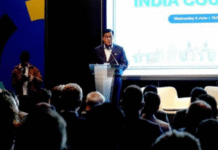By Meghna Mittal and V. S. Chandrasekar
New Delhi–Former finance minister and BJP veteran Yashwant Sinha says that there is a threat of indiscipline and unravelling of the Goods and Services Tax (GST) if states follow the example of Tamil Nadu levying additional taxes over the agreed rate in a particular sector.
He also feels that the new law is not a perfect GST as it is fraught with multiplicity of rates and full of compromises.
Sinha warned of an imminent threat of indiscipline among states, if they follow Tamil Nadu in their desire to earn more revenue. Tamil Nadu has levied an additional 30 per cent entertainment tax along with the 28 per cent GST rate.
“Tamil Nadu’s additional entertainment tax is baffling. Any additional levy by states, right in the beginning, was eminently avoidable. There is not only a threat of indiscipline. If the states go their own way and no not abide by one discipline, the whole thing will unravel, then what’s the point of GST,” he told IANS in an interview.
Such matters should be brought to the notice of GST Council, which should discuss and persuade states not to adopt such things, he said. “It is a matter of consensus.”
Sinha, who has come out with a book on ‘The Future of Indian Economy — Past Reforms and Challenges Ahead’, said the GST, which is being touted as the biggest tax reform since independence by the Modi government, was imperfect as the government chose multiplicity of taxes, hence losing out on the aim of simplifying the indirect tax regime.
“Is it a perfect GST? No, it is not. It is a result of various compromises as a result of which we have re-introduced multiplicity of rates. We have brought back 6-7 rates. Multiplicity in indirect taxes is the enemy of simplicity. I am feeling disillusioned because of introduction of multiplicity of rates in GST,” he said.
Refuting the Finance Minister Arun Jaitley’s logic that the multiplicity was chosen as an instrument to maintain equity between the goods meant for the poor and rich, Sinha said that direct tax and not indirect tax is used for equity.
“The point is that indirect taxes is not the instrument of equity in society, direct taxes are. That is why exemptions are given on income tax. All countries have used direct taxes to establish equity and not indirect tax. All countries which have GST have either one or two rates, not multiplicity of rates,” he said.
“It will also lead to litigation and lobbying with all its ill-effects, loss of simplicity,” he added.
Labelling the multiplicity of taxes as a measure of excessive caution, Sinha said that the idea of GST was a revenue neutral rate and a simple tax with refund scheme, which is not the outcome. “I think we have erred on the side of excessive caution.”
He also dismissed GST as the biggest reform since independence, Sinha said that GST covers only indirect taxes out of the three types of taxes — direct, indirect and customs. Moreover, almost 40 per cent of revenue stream in indirect taxes is outside the purview of GST currently, he noted.
“Is it the most important reform after independence? Clearly not. It relates to one out of the three taxes. Economic reforms is much wider subject. The kind of attempt that was made in 1991 to introduce budgetary reforms, change industrial policy, taxation, was much bigger than GST is today,” he said.
“Also almost 40 per cent of revenue stream is outside GST in terms of alcohol, electricity, petroleum products. We are covering only 60 per cent revenue under GST,” he added. (IANS)






